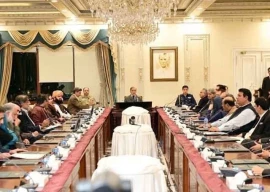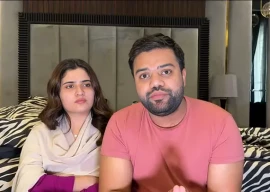-copy1609480584-0/image-(1)-copy1609480584-0.jpg)
It’s been over a decade that Facebook really took off in Pakistan. It’s so ubiquitous now that your grandmother and her sister are on it, without fail wishing each good a good morning and blessed day to come. The truck driver carrying cargo from Peshawar to Lahore posts pictures along the way. It’s a universal service, but perhaps most tellingly, it has an old-world sense of respectability.
Memories are short – before Facebook became boring and acceptable, just less than ten years back there was an obsession about what the platform was doing to the youth of the country. Parents worried that it was leading to immorality, and politicians from the right would chime in for support. But it kept growing. And so, the holdouts joined and began to see it was more than just a space for “line maarna”. But perhaps most critically, Facebook ceased to be an ungoverned space for the youth to explore themselves and make new connections. Facebook started to become a lot like Pakistan itself – intergenerational and connected, with an active presence of institutions and political entities. Rather than being a freeing space, Facebook began to be an extension of our real lives, not a new digital one. On Facebook now, aided by its algorithm, we flock to what we know and believe rather than it being a gateway to something new. And even if we venture out to something new, we have new self-appointed Gasht-e-Online moral policing the political, moral, and social “deviants” with ever-ready online mobs.
The thing about history repeating itself is that it always seems new: our memories are short. This year there was significant concern about the social media platform TikTok – and in a year dominated by COVID-19, TikTok still managed to claim headlines. Donald Trump, India and Pakistan were all concerned by this new platform for their own differing reasons.
One can argue that the threshold of something on the edge of true fame is whether it causes a moral panic. We saw that with Facebook, with satellite TV even before that and so on. But the worry about TikTok is truly different in one remarkable aspect. It’s a platform that first resonated with the lower-income tier of the nation – our historical followers were now creating their own space. And in this space, they were the primary creators.
Facebook, Cable and Satellite TV, when new all had one thing in common. The early adopters were from the upper levels of society, as were the content producers. Facebook came at a time before internet access had been democratized with cheap plans and robust phone data, and before smartphones started to cost the same as older dumbphones. The new 24/7 news and entertainment channels were all staffed by the kings of the old guard of old media who brought in new staff and trained them in their ways. Sure, new media brought new talent with it – but they were generally scraped from a certain class. New technology didn’t do away with the old boys networks. TikTok has upended that, as relatively privileged classes turned up their noses to the new platform, the unheralded classes made it their home.
TikTok is different. Some of its superstars are sweepers, goat herders, and stage dancers who could never make a place for themselves on Television. It’s also a place for sexual minorities and transgenders. Its home to emo girls and boys who live and breathe Bollywood. Its Pakistan in all its complex glory without an Instagram filter, an ISPR lens, a PTI frame or a PMLN narrative.
@irfanmuhammad480 Dra diya @rambodil786 #irfanmuhammad480
♬ Original Sound - Unknown
Earlier this year, I called a very close friend of mine who is an academic in the UK. We were discussing what’s up in our lives, and as is usual, talk turned to the politics of the country. In that moment I remember clearly telling him to download TikTok. My pitch was simple – we have lost touch with what the “people” are, in fact, we probably never knew it to begin with. I remember asking my friend, “What is it the Pakistani male really wants to do?”. And he gave a few aspirations as an answer – I disagreed. I told him what the Pakistani male really wants to do is dance. My friend didn’t buy it, and I told him the only way this could be resolved was for him to download the app.
He didn’t seem convinced, but a month later he called me after a pique of boredom led him to download the app and down the rabbit hole of its endless content. And he was engrossed, it was a window into the lives of people who have never had much in the way of representation, or even a voice. And yes, Pakistani men did seem to him like they wanted to dance. A lot.
The media lens for poverty or lower-income groups is fairly standard here and around the world. Their coverage is rudimentary and full of binaries – what they don’t have, what they want. Their lives are poorly lit, there is no rich tapestry defining what makes them laugh, or how they would like to dress, or who they would like to love. These classes also want to have fun, they want things beyond nutrition and services, they have lives they want to live.
This is where TikTok shines. A pair of TikTok stars who work as sweepers love getting their hair done, with streaks of blonde highlights. They show off their new phones and funky shades. And even in the world of TikTok, the lower middle classes lay into them for behaving “above” their station in life. But they continue undeterred – chronicling their life, filming their style.
There is an agricultural worker with folksy wisdom and an incredibly warm and inclusive worldview, Pholu. He has outstripped many of Pakistan’s megastars with the number of people following him. Pholu has not allowed “soloubty” to affect him, though he does have gold highlights in his hair now and is embracing the more mod elements of TikTok life. When TikTok was banned, some users taunted him that he would be relegated to the life of labour once again to which his response was that there is dignity in labour. Pholu is refreshing, his earnestness and his positivity is unforced, and perhaps most critically, it comes from the soil, unvarnished by the “isms” or manufactured histories that tend to dominate discourse.
Then there are the brick kiln workers – sweaty from an unrepentant and unforgiving sun, doing their martial arts, choreographed to nationalistic songs that have found a huge audience. They rip their shirts in aggression and pump their fists in the air for the motherland. It appears corny but can be quite affecting to see such unbridled love from those who have received the least from the state.
@naseer_baloch_006 ham mazdoor log hen hamare pass nhi he @umairrr_official
♬ original sound - Naseer Baloch
And then there is the comedy. It’s unfortunate the world doesn’t know how morbidly funny the people of this country can be. But I don’t think most Pakistani’s would know just how funny Pakistani’s can be in under a minute. The satire, spoofing and physical humour is just overwhelming in its sheer volume. And again, it comes from average folk, young and old.
If TikTok has humanized anyone, it is men with beards. With facial hair strongly signaling virtue, there is enhanced opprobrium when the bearded embrace levity. Brothers Atif and Amir Sheikh from Karachi make these hilarious dance videos with one playing the straight man and the other using the rubbery quality of his body that syncs comically to music. They are massively popular, and at the same time garner criticism for videos that do not behoove the follicles they have grown.
@usmanasim66 Blooper hahaha 😂 #famousmolvi @rj_hamza66
♬ original sound - 🔥 A-J 😎
But it is the young, boys and girls that are endlessly fascinating. In something I don’t quite understand – there is an obsession with videos about men and women, relationships and loyalty mined from Indian cinema in an incredibly emo fashion. These skits provide them the opportunity to relive the romance of the films they are obsessed with.
That being said, I’d be remiss not to mention the OG of TikTok – Hareem Shah. Her antics made it look like she would have single-handedly brought down the government, and her failure to do so has forced the hand of the PDM.
I do concede there are problems, massive problems. There is vulgarity, inappropriate content, and a total ease of entry for children entirely unsupervised. But matters of taste should not be the subject of regulation, but potential harm to children and others definitely should. Young sexual minorities with flamboyant on-screen presences could be putting themselves in harms way. That ethos of Bollywood mentioned earlier – well, the most regressive of tropes are reproduced and embraced. Kalilur Rehman Qamar would approve if it wasn’t Indian derived.
But that’s what has made the concern over TikTok so problematic in Pakistan. Matters of taste are mixed with harm reduction policy proposals. And what’s so interesting about the taste issue is that well-known media celebrities take issue with the content of TikTokers – which really goes back to class. Modelling with skin is kosher if it is for an haute couture
brand or international apparel – but should the underclass wear what they want, it’s a problem. Gyrating to a seductress in a Lollywood item song is all good as long as a silai wala doesn’t recreate a similar Bollywood scene with his friends. That’s what makes TikTok so infuriating to everyone, it has done away with our gatekeepers of culture. For now, at least.
In many ways, there are now more avenues than ever to become famous. And despite this endless choice, it’s also more difficult than ever to become famous. Our media consumption habits have become so fragmented that we have stars famous in certain pockets and demographics without ever truly attaining crossover appeal. It’s the era of balkanized celebrity. And we don’t like what we don’t know. Especially when they look like that.
2021 is going to be the same, we’re going to continue to hate the game and the playa’s of TikTok. At least until the current establishmentarians of culture can find a way to dominate the space.
Fasi Zaka writes about music, culture, and politics for the press in Pakistan. He tweets @Fasi_zaka






















1714117028-0/BeFunky-collage-2-(1)1714117028-0-270x192.webp)




1714370039-0/ojwilson-(1)1714370039-0-270x192.webp)
-(1)1714378140-0/AliAminMaryam-(4)-(1)1714378140-0-270x192.webp)








COMMENTS
Comments are moderated and generally will be posted if they are on-topic and not abusive.
For more information, please see our Comments FAQ